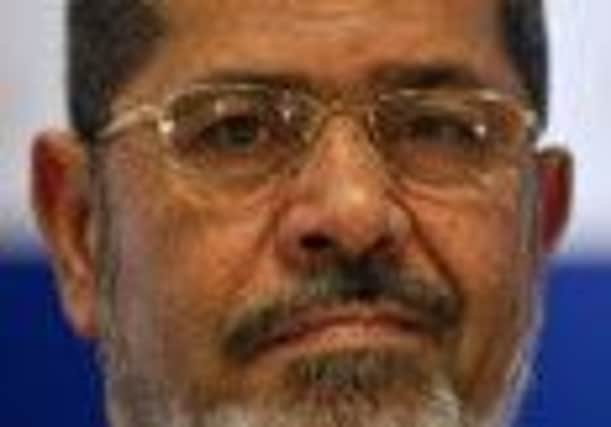Egypt: Defiant Morsi insists he is still president


A Cairo court was told yesterday it lacked the jurisdiction to try the Islamist former head of state, insisting he remained Egypt’s legitimate leader because there has been no official decree removing him from office.
The claims by Mohammed Salim el-Awah came as the trial of Morsi and 14 others on charges of inciting the killing of protesters in 2012 resumed amid tight security in a makeshift courtroom in the national police academy in an eastern Cairo suburb.
Morsi is now facing four separate trials on charges of:
Advertisement
Hide AdAdvertisement
Hide Ad• Inciting supporters to commit violence and murder as they attempted to break up an opposition protest in Cairo in December 2012;
• Conspiring with foreign organisations to commit terrorist acts, with prosecutors accusing Morsi of forming an alliance with the Palestinian militant group Hamas and Lebanon’s Hezbollah;
• Murdering prison officers in a jailbreak in 2011 during the uprising against the then-president Hosni Mubarak;
• Insulting the judiciary.
The Muslim Brotherhood’s insistence that Morsi remains president is part of its strategy to defy Egypt’s new military-backed government at every turn. He was held in a soundproof glass cage during yesterday’s hearing and could only address the court directly when permitted to by the judge.
Morsi was overthrown in a military coup on 3 July that followed massive street demonstrations calling on him to leave office. He is now held at a high security prison near Alexandria.
The case stems from violence outside the presidential palace in December 2012. Morsi’s supporters attacked opposition protesters, sparking clashes that killed at least ten people. The defendants are charged with inciting the killing of three of those protesters.
Defence lawyer El-Awah contended that, because Morsi remains president, the law governing the trial of serving presidents must be observed, according to an account of the proceedings by the Egyptian Middle East News Agency.
Morsi and most of the defendants turned their backs to the court when Judge Ahmed Sabry Youssef played several video recordings of the clashes outside the palace in 2012.
Advertisement
Hide AdAdvertisement
Hide AdAnti-Morsi protesters outside the police academy briefly surrounded El-Awah’s car as it approached the gate. Some pounded on the car while others yelled insults.
Egypt has been rocked by violence since Morsi’s jailing, with the army facing a full-blown insurgency in the Sinai peninsula. In the rest of Egypt, attacks on high-profile Cairo targets are growing more frequent. Meanwhile the government has cracked down on the Brotherhood and its allies, killing hundreds and jailing thousands since July.
Rise and fall: years of upheaval
January 2011 Thousands of anti-government protesters demanding the removal of Hosni Mubarak from office clash with police, marking the start of the Arab Spring in Egypt.
February 2011 Demonstrators celebrate after Mubarak resigns following 18 days of protests against his rule. Power is handed to the military pending a free, democratic election.
June 2012 The Muslim Brotherhood’s Freedom and Justice Party candidate Mohamed Morsi wins Egypt’s first free presidential election. Thirteen months of tumultuous rule follow.
July 2013 Hundreds of thousands of opponents of Morsi turn out to protest on the streets, launching a push to force him from office on the first anniversary of his inauguration. Morsi’s Islamist supporters vow to defend him.
President Morsi is ousted by the Egyptian military. He is held in a military facility with top aides. The head of the Supreme Constitutional Court, Adly Mansour, is announced as the interim head of state.
September 2013 Morsi is charged with inciting the murder of protesters. Many of the charges levelled against him carry the death penalty.
Yesterday in court Morsi’s lawyer argues that the Islamist politician is still Egypt’s legitimiate president because he has not resigned his position.